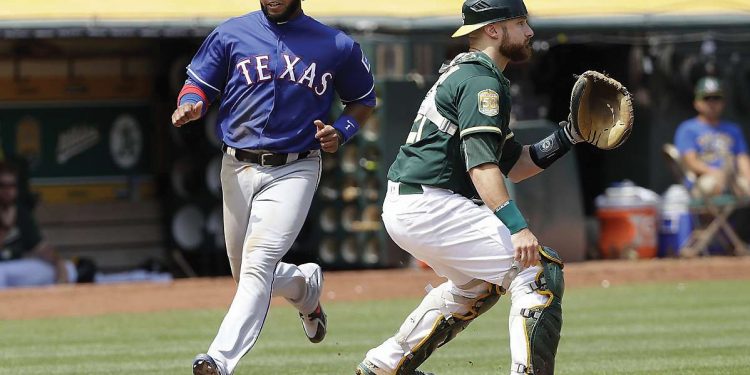It is a phrase that has been uttered after nearly every trade in the history of the Major Leagues: “Baseball is a business.” Yet, rarely has it hit so close to home, rarely has it hit so hard. Maybe that is because Elvis Andrus plays the game with the passion, the enthusiasm and the smile of a child. He plays as if he does not know it’s a business.
Of course, he does know. In fact, in July of 2007 the business of baseball was on full display. The Rangers traded Mark Teixeira to Atlanta for five up-and-coming prospects. Among them was an 18-year-old shortstop regarded as the second best prospect in the Braves organization. In August of 2007 Elvis joined the Rangers organization and went about the business of proving he was worthy of that lofty ranking.
By Opening Day of 2009 it was clear that he was. Michael Young had agreed to move to third base, clearing the way for a guy who would occupy the shortstop position for a dozen years.
Omar Vizquel was also on the roster in 2009. The 11-time Gold Glove winner was signed to show Elvis the ropes. Perhaps Omar was a great teacher, or, maybe, Elvis is just a fast learner. He was the second youngest player in the American League that year, and he started 145 games and finished second in balloting for Rookie of the Year.
In 2010 the Rangers sent a message to the rest of the American League: “We mean business!” Elvis was already thriving. He made the All Star Team in his second season, and by the end of the year he was leading off, as well as playing shortstop. You might say he was front and center in the Rangers quest to win their first World Series.
The 2011 team was the best in franchise history. Bolstered by the off-season acquisition of Adrian Beltre, Elvis hit .279 that year – a full 14 points higher than in 2010. He also had more RBIs, more hits and more steals than in the previous season. The end of that year was heartbreaking, but with this version of Elvis there was hope for even better years to come.
There was also a friendship developing between the Rangers third baseman and the shortstop. The business of baseball had become funny business, as Elvis and Adrian had more fun on the field than the law allows. For eight seasons, business as usual for these two was a youthful enthusiasm rarely seen before or since.
Elvis had his ups and downs during the years that he played with Adrain, mostly ups. Like his appearance in the 2012 All Star Game, the second of his career. And before the start of the 2013 season he was rewarded with an eight-year, $120 million contract extension.
There were downs, too, like Game 5 of the ALDS in Toronto in 2015. Elvis had two errors in a three-error inning, as the Jays came from behind to beat the Rangers.
After the game Elvis stood at his locker, took responsibility and proved what a good leader – what a good man – he had become.
His response to that disappointment was the 2016 season when he hit over .300 for the first time in his career. Then 2017 when he hit 20 home runs, more than twice as many as in any previous season.
He hoped to follow up that power surge in 2018, but on April 11 he was hit by a pitch that fractured his elbow. He went on the injured list for the first time in his career. He was back in business by mid-June and played in 97 games but could never regain the form of the previous two seasons.
The past two years have been barely OK by his own lofty standards, but when you look at the last 12 you see something so special. Elvis was always taking care of business off the field. He was loved by this community and he loved it right back, in the form of charity appearances and autograph signings and smiles and hugs and fun.
The Rangers acquired Elvis to help build a championship team. Now they have come full circle, trading him in an attempt to rebuild the organization to a championship level. They traded him within the division. They know this is risky business. They will see him a lot, they will face him a lot. They realize that there is a chance that they will find themselves on the business end of an Elvis Andrus resurgence.
















